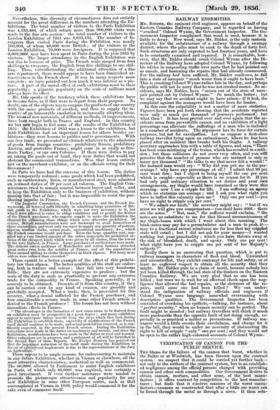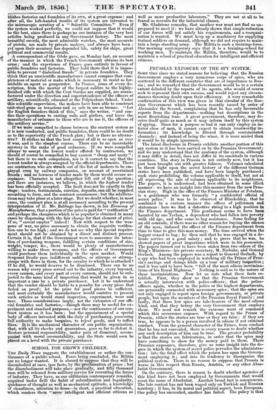VERIFICATION OF CANNON FOR THE PUBLIC SERVICE.
THE blame for the failure of the cannon that burst, whether in the Baltic or at Woolwich, has been thrown upon the contract system : we suspect that it could be carried yet further back— not only to the authors of the contract system, but to an establish- ed negligence among the official persons charged with providing cannon and other such commodities. Our Government desires to obtain cannon, mortars, and other arms, of the best manu- facture ; it offers contract by competition to the best manufac- turer; finds that it receives cannons of the worst manu- factur-cannons so constructed that after a little use water can be foreecrthrough the metal as through a sieve. It then esta-
tlishes factories and foundries of its own, at a great expense : and after all, the left-handed 'results of its system are intrusted to the microscopic scrutiny of a " Scientific Committee." Even if the system worked perfectly, we could not suppose that it would be the best, since there isperhaps'no one instance of the very best i articles being produced in any Government factory. The most beautiful swords, the most admirable watches, the most accurate of pistols, are made by private makers, and always have been ; yet upon their accuracy has depended life, safety for ships, great political and commercial results.
• A correspondent of the Globe gave, on Monday•last, an account of the manner in which the French Government obtains its best arms ; and the experience of France goes - entirely in favour of public foundries and factories. They hold there that it is impos- sible to prevent " diabolical frauds in private foundries. They think that an unscientific manufacturer cannot compass that com- pleteness of material or make which is necessary to resist so for- midable an agent as gunpowder. In France, arms of every de- scription, from the mortar of the largest calibre to the highly- finished kfle with which the Cent Gerdes are supplied, are manu- factured under the direction and superintendence of the officers of artillery, scientifically educated at the Polytechnic School. Under this scientific supervision, the makers have been able to construct cast-steel guns as tenacious and as safe in use as bronze. "Let the English founders think of this," says the writer, " and con- fine their operations to casting rails and girders, and leave the manufacture of ordnance to those who are to use it, the officers of
the artillery service." •
If we were compelled to choose .between the contract system as it is now conducted, and public foundries, there could be no doubt as to the superiority of the French plan ; but is there no alterna- tive? It strikes us that the best course of all is as open as ever it was, and is the simplest course. There can be no inscrutable mystery in the make of good ordnance. If ..we were compelled always to accept the lowest tender offered by contractors, we should of course be compelled to buy cannon " cheap and nasty" ; but there is no such compulsion, nor is it correct to say that the lowest tender is always accepted by the official departments. There are contractors who are struck out of the list of makers to be em- ployed even by railway companies, on account of ascertained frauds ; and no lowness of tender made by them would secure ac- ceptance. Character is not altogether left out of the question ; and there are instances, we believe, in which the highest tender has been officially accepted. The fault does not lie exactly in this stage : tenders, testimonials, sureties; deposits, can all be supplied according to form, and the contract commences ; but the adultera- tions may take place at slater stage. But we doubt whether, in most cases, the contract plan is at all necessary according to the present interpretation of it. Mr. Babbage has shown, in his Economy of Manufactures, that a portion of the price is paid.for " verification" ; and perhaps the cheapness which is so popular is obtained in many eases by dispensing. with the fair charge for that element of price. If so, " caveat emptor " indeed! Now with respect to the wea- pons of war, no price necessary to obtain the requisite verifica- tion can be too high ; and we do not see why this special require- ment should not be obtained by a direct and distinct process. Certain it is, that if the Government were to announce its inten- tion of purchasing weapons, fulfilling certain conditions of size, 'weight, temper, &c., there would be plenty of manufacturers willing to make those weapons, and the officers of Government could purchase them individually in the open market. Would Sergeant Brodie pass indifferent saddles, or stirrups or stirrup- straps with flaws in them, for the cavalry to which he is attached ? If he did, he would deserve to be dismissed. There can be no reason why every piece served out to the infantry, every bayonet, every cannon, and every part of every cannon, should not be sub- jected to the same kind of inspection that would be given in so important a case by a private piirchaser. Let it he understood that the vendor should be liable to a penalty for every piece that failed on proof ; let the price for good pieces be sufficient, and most certainly the manufacturer would contrive to present such articles as would stand inspection, experiment, wear and tear. These considerations imply, not the extension of our offi- cial foundries and factories,—though these may be useful for ex- periment and standard purposes,—nor the continuance of our con- tract system as it has been ; but the appointment of a special body of officers intrusted with the duty of- purchasing, possessing full authority to make bargains, to reject goods, and to inflict fines. It is the mechanical character of our public organization, that, with all its checks and guarantees, -goes so far to defeat it. Restore personal responsibility, under pain of--dismissal, accom- panied with moral accountability, and the State would soon be pieced on a level with the private purchaser.



























 Previous page
Previous page